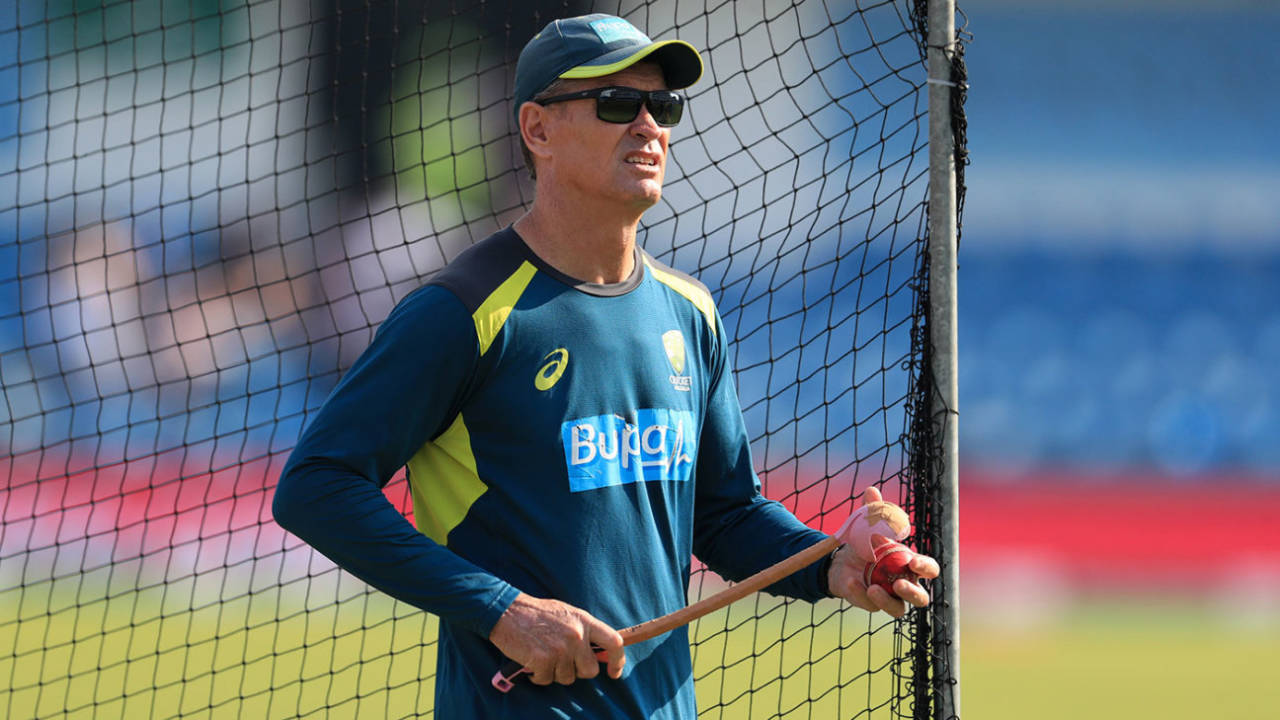When Graeme Hick asked the tough question
The batting coach gained considerable respect for approaching the subject of executive pay
Daniel Brettig
Jun 17, 2020, 11:23 AM
Graeme Hick spent many hours giving throwdowns to Australia's batsmen • Getty Images & PA Images
On April 21, Cricket Australia's staff were still trying to make sense of the stand downs imposed on more than 200 of their number, and fear and uncertainty were rampant.
It was one of many days punctuated by a video conference call from then chief executive Kevin Roberts, who was also to speak to the media for the first time to explain CA's scorched earth approach to preparing for the possible financial toll of the coronavirus pandemic.
These calls had, prior to the stand downs, been characterised by general bonhomie and vague expressions of optimism by Roberts. Even on the day that he announced that a host of staff were to be stood down, there had been a combination of shock and sympathy for the chief executive, before the arithmetic of the decision-making was more widely understood.
By April 21 however, there was greater understanding and frustration, particularly with one point. How was it possible that the majority of stood down staff would be left with just 20% of their usual salaries, while executives were retained on 80% of their own, far more substantial pay packets.
But it required bravery and outspokenness, particularly in an environment where every single staff member was apprehensive about their future and how it might be decided upon, to speak up and ask the obvious.
Over the preceding few months, there had been mirth about the fact that in the Amazon documentary The Test, Australia's longtime batting coach Graeme Hick was seen and not heard throughout, despite hours of footage of meetings, training sessions and matches. Based on that glimpse into the team, many had been left to conclude that Hick was not one to speak up, and in truth, he seldom has been, preferring to be a quiet assistant to the batsmen.
But in this moment of fear, uncertainty, apprehension and doubt, but also mounting frustration, anger and incomprehension, it was Hick who asked Roberts the key question about why there was such an inequitable split of financial pain. How, Hick asked, was the 80% pay figure reached for executives?
In the face of such a direct and challenging question from the ranks, Roberts fell back on one of the old cliches of selectors dealing with a particularly knotty decision. This was a judgement call, made back in March.
He then pivoted to suggest that by eliminating all performance bonuses for executives, the pay cut for the top tier of his management was actually more significant than the 80% figure indicated, before adding that he was happy to work around the clock, all week long, to get his staff back on deck. Roberts insisted, as he also did publicly around that time, that in the likely event that things would get worse, he would take a bigger pay cut.
But he also stated that, in his mind, a 20% pay cut while working extra hours was hopefully an equal share of the load relative to an 80% pay cut while being stood down. This response went down like the proverbial lead balloon, as did the suggestion on the same day that some of the stood down staff could find themselves working at Woolworths. Hick, though, had gained a lot of respect from the rest of the staff for being willing to ask a pointed question at such a fearful time.
Fifty-seven days later, about a cricket tour's worth, the agony of stand downs while waiting for redundancies has ended for 40 CA staff, and Hick is among them. His place as Steven Smith's chief throwdown merchant will likely be replaced by Marnus Labuschagne rather than support staff, as the players are made to be more self-sufficient by having fewer coaches around them. There is no suggestion that Hick's question played any role in the subsequent decision to part ways.
But it is to be hoped that Hick's courage in that April 21 moment is not forgotten. He had at least challenged Roberts and CA in a way that many more did subsequently, whether other staff, state associations, or the Australian Cricketers Association, and in concert with a rapidly improving Covid-19 outlook ensured that far fewer employees lost their jobs than otherwise.
Earl Eddings, the CA chairman, spoke with respect for departing staff. "When you lose really good staff like today, it's really gut-wrenching, and through no fault of their own, there's a crisis that's hit everybody," Eddings said. "To lose 40 really good people is really soul-destroying. So this has been really tough, and saying goodbye to those people is incredibly difficult."
But even as he held his own videoconference to the media, Eddings was watched by two state chairmen - Queensland's Chris Simpson and Cricket Victoria's Paul Barkerwere also present. The circumstances that compelled Hick to stick his head above the parapet have left CA needing to make far better explanations than Roberts had done.
Daniel Brettig is an assistant editor at ESPNcricinfo. @danbrettig
